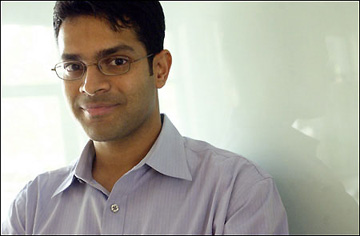
| T H E N I H C A T A L Y S T | N O V E M B E R – D E C E M B E R 2004 |
|
|
|
NIH/HUGHES SCHOLAR MOOTHA WINS MACARTHUR AWARD |
 |
|
The
look of genius: Vamsi Mootha
|
NIH undoubtedly trains many beautiful minds. In October, the MacArthur Foundation confirmed the intellectual beauty of one former trainee by awarding Vamsi Mootha one of its "genius awards"—a five-year, $500,000 no-strings-attached fellowship.
Mootha, 33, is currently an assistant professor of systems biology at his alma mater, Harvard Medical School in Boston (and assistant professor of medicine at Massachusetts General Hospital in Boston). He was one of 23 recipients of a 2004 Fellowship from the John D. and Catherine T. MacArthur Foundation.
Mootha’s research focuses on mitochondria. He used innovative "neighborhood analysis" data-mining methods to combine functional, expression, and gene position data to identify the flaw underlying the rare, fatal Leigh syndrome, French-Canadian Variant. LSFC claims one in 2,000 children born in the Saguenay/Lac-Saint-Jean region of Quebec. Mutations in the LRPPRC gene lead to cytochrome c oxidase deficiency, with resulting developmental delays and fatal build-up of lactic acid in the blood, typically after infection or other stress.
While the LSFC discovery was impressive, it is likely that what caught the eye of the MacArthur selection committee was Mootha’s sleight-of-hand in pulling biological and clinical discoveries, like rabbits, out of unpromising and vast genomic and proteomic datasets.
Mootha and collaborators have now moved their mathematical sorcery to type 2 diabetes. After categorizing functional categories of genes from expression data, they were able to detect a difference in mitochondrial gene regulation between people with and without diabetes.
"Vamsi is not attempting to reduce the problem to its simplest elements, but to accept the complexity of biology and develop the tools we will use over the next several decades to unravel the interactions that naturally occur," observes NHLBI scientific director, Bob Balaban. Mootha was an NIH/Howard Hughes medical student in Balaban’s lab from 1995 to 1997 before returning to Harvard to complete his M.D. Balaban calls Mootha’s LSFC, diabetes, and overall mitochondrial proteomics "landmark studies in mitochondria research."
Balaban says Mootha revealed his genius potential within the first two weeks of setting foot in his lab. "Vamsi was simply a remarkable student," Balaban recalls. "His first paper was generated by making a novel technical observation, working out the details, and writing up the paper over a period of about a week."
The paper looked nearly flawless to Balaban. "I did not have to modify anything other than to add some references. This was also the first scientific paper he ever wrote!"
The journal reviewers agreed with Balaban’s assessment and published the paper without any revision. Balaban calls Mootha "one of the brightest, most energetic fellows I have ever had in the lab"—and "one of the most enjoyable people to interact with . . . . The [MacArthur] committee did a spectacular job in identifying Vamsi as a genius. . . . It is going to be great to watch him soar."
And for his part, Mootha told The NIH Catalyst, "I was very fortunate to land in Bob Balaban's laboratory. [He] had set up a wonderful environment in which physicians, physicists, and biochemists could work together to use quantitative approaches to explore problems related to energy metabolism and human disease.
"The year at the NIH was a very special one. . . . It was during this time," Mootha recalled, "that I fell in love with mitochondrial metabolism."
Asked how he plans to use the "genius grant," Mootha has told the press he is uncertain, but his thinking is heading in directions that seem very much in the intramural NIH tradition of adventurous research [see editorial]. A Harvard press release says Mootha’s initial thoughts are to investigate rare mitochondrial disorders. "I want to do something deliberate with the money, maybe research some riskier areas," Mootha said. "Some of my crazier ideas will be funded with this money."